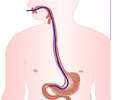- Ratnaike RN. Whipple’s disease. Postgrad Med J 2000;76:760–766
- Fenollar F, Raoult D. Clinical and Diagnostic Laboratory Immunology 2001;8: 1-8.
About
Whipple’s disease is a serious
Whipple’s disease is caused as a reaction to an infection with a bacterium called Tropheryma whippelii.
The predominant symptoms of Whipple’s disease are due to the involvement of the digestive tract and the subsequent malabsorption of nutrients. Other systems like the joints and the brain are also commonly involved.
The reverse transcriptase PCR test, done on biopsy samples of affected tissues, helps in the definitive diagnosis of the condition.
Antibiotics like trimethoprim-sulphamethoxazole are effective in the treatment of Whipple’s disease, to which a dramatic response is often observed. Treatment has to be continued over prolonged durations.







